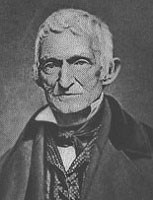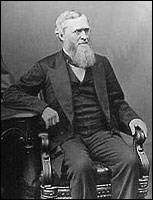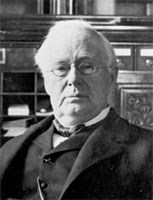|
A family plot located on a low rise in the Sleepy Hollow Cemetery in Concord, Massachusetts serves as
the final resting place for three prominent members of one America's most famous political families:
Samuel Hoar (May 18, 1778 - Nov 2, 1856) and his sons
Ebenezer R. Hoar (Feb 21, 1816 – Jan 31, 1895) and
George Frisbie Hoar (Aug 29, 1826 - Sep 30, 1904)
 Samuel Hoar (United States lawyer
and polititian) was a native of Lincoln, Massachusetts
and an 1802 graduate of Harvard University. He helped establish the Concord Academy in Concord, Massachusetts, and
was a founder of the Republican Party in Massachusetts. During his most important political years, Hoar served
two terms in the Massachusetts State Senate, and from 1835 to 1836, was a member of the United States House
of Representatives. Samuel Hoar (United States lawyer
and polititian) was a native of Lincoln, Massachusetts
and an 1802 graduate of Harvard University. He helped establish the Concord Academy in Concord, Massachusetts, and
was a founder of the Republican Party in Massachusetts. During his most important political years, Hoar served
two terms in the Massachusetts State Senate, and from 1835 to 1836, was a member of the United States House
of Representatives.
Hoar is most widely known for events surrounding his 1844 attempt to particpate in a legal battle in
South Carolina. At the heart of the conflict was South Carolina's seizure of free African Americans working on ships docked at their sea ports. South Carolina had threatened to sell the captives into slavery unless the
ship's captain paid a ransom. As an expert in maritime law, the Commonwealth of Massachusetts chose Hoar to represent
Massachusetts in challenging the constitutionality of such actions. When Hoar arrived at Charleston, local residents,
(who considered him to be a "Yankee medler") mobbed Hoar, and warned him to leave town. The South Carolina legislature barred
Hoar from appearing before that South Carolina courts. News of the incident greatly angered those in the North (especially
in Massachusetts), and the incident served to further raise sentiment against slavery.
 Ebenezer R. Hoar (United States lawyer
and polititian, son of Samuel Hoar and brother of George Frisbie Hoar, grandson of
Roger Sherman) was a Harvard graduate, elected to the Massachusetts State Senate in 1846
as an anti-slavery Whig. He served as a judge of the Court of Common Pleas from 1849-1855, and as a judge of the Massachusetts
State Supreme Court from 1859-1869. Ebenezer R. Hoar (United States lawyer
and polititian, son of Samuel Hoar and brother of George Frisbie Hoar, grandson of
Roger Sherman) was a Harvard graduate, elected to the Massachusetts State Senate in 1846
as an anti-slavery Whig. He served as a judge of the Court of Common Pleas from 1849-1855, and as a judge of the Massachusetts
State Supreme Court from 1859-1869.
Ebenezer Hoar was appointed Attorney General of the United States by President Ulysses S. Grant, serving from March 1869
until his resignation in June of 1870. In 1869, President Grant also nominated Hoar as an Associate Justice of the U.S. Supreme
Court but was not confirmed by the Senate. Hoar was elected as a Republican to the Forty-third Congress (1873 - 1875),
and was a member of the board of overseers of Harvard University during the period from 1868 to 1882.
 George Frisbie Hoar (United States lawyer
and polititian, son of Samuel Hoar and brother of Ebenezer R. Hoar, grandson of
Roger Sherman) was also a graduate of Harvard. He was
one of the founders of the Worcester County Free Institute of Industrial Science (now Worcester Polytechnic Institute).
Hoar represented Massachusetts as a member of the U.S. House of Representatives from 1869 to 1877; he then served in
the U.S. Senate until his death in 1904. George Frisbie Hoar (United States lawyer
and polititian, son of Samuel Hoar and brother of Ebenezer R. Hoar, grandson of
Roger Sherman) was also a graduate of Harvard. He was
one of the founders of the Worcester County Free Institute of Industrial Science (now Worcester Polytechnic Institute).
Hoar represented Massachusetts as a member of the U.S. House of Representatives from 1869 to 1877; he then served in
the U.S. Senate until his death in 1904.
Hoar was widely known as a fighter against political corruption. He campaigned for the rights of African Americans
and Native Americans, and argued in the Senate in favor of Women's suffrage as early as 1886. He was part of the
Congressional Electoral Commission involved with settling the highly disputed U.S. presidential election controversy
involving Samuel Tilden Rutherford Hayes in 1876. Hoar authored the Presidential Succession Act of 1886.
In addition to his political acheivements, George Hoar was active in the American Historical Society and the
American Antiquarian Society, serving terms as president of both organizations. He was a regent of the
Smithsonian Institution in 1880, and a trustee of the Peabody Museum.
He died in 1904 in Worcester Massachusetts. After his death, a statue of Hoar was erected in front of
Worcester's city hall, paid for by public donations.
|